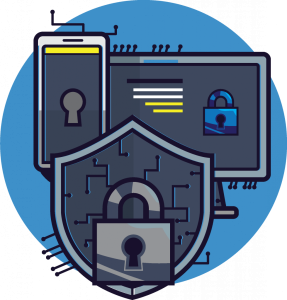Comprehensive network security
4. MALWARE AND ANTIVIRUS
4.5. The Specific Case of an Antivirus
Apart from antimalware software and tools, there are also antivirus software capable of dealing with that specific malware type (viruses). Antiviruses are much more known and almost every single user has it installed on their desktop and laptop devices.
Antivirus is a program used to prevent, scan, detect and delete viruses from a computer, system, or network. Once installed, most antivirus run automatically in the background, providing real-time protection to the system it is installing and avoiding virus infections and attacks.
Comprehensive protection programs help on the protection of files and hardware from malware such as worms and viruses, but also against trojan horses and spyware. Additional protection is, though, important and these tools should be working in along with firewalls and antimalware tools, increasing the security level and, hence, providing a high level of data protection.
In general, antivirus programs and computer protection software are developed to analyse data, including not only local files, but also web pages, installed applications and other software, to help finding and removing malware the way and as fast as possible.
Most antivirus tools provide a real-time protection, running in the background, and that its capable of protecting devices from incoming threats, attacks, and virus infections. It constantly scans the device for known threats and provide automatic updates, identifying, blocking, and deleting malicious codes and viruses.
Nowadays, most activities are performed online, and, because of this, new threats emerge every day, making it important the use of a protective antivirus program. Fortunately, there are also many excellent products on the market today, capable of dealing with such threats and infections. Among the main antivirus developers, it’s possible to highlight the Norton, McAfee, TrendMicro, Checkpoint, between others.
